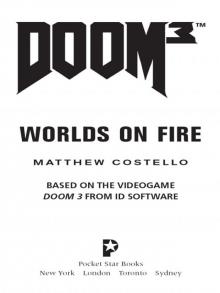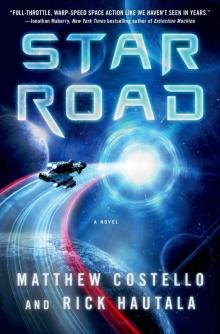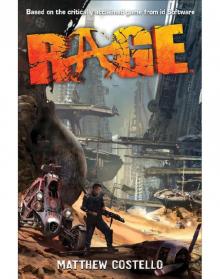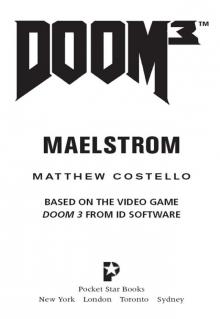- Home
- Matthew Costello
Rage Page 4
Rage Read online
Page 4
Until the winch stopped. Then Hill looked up at the machine. There were a few meters of chain left on the spool, but the Ark had hit its final resting place.
Like a strange kind of burial.
He muttered the word to himself. A benediction.
“Amen,” he said.
And then he stood up.
Even as the last meters of chain rolled back onto each chopper’s winch, a team of bulldozers were already at work pushing the mounds of dirt and rock back into the hole, like planting a bulb.
In hours, it would look like any other spot in the desert.
Back in his seat, the pilot looked over at him.
“Want to stay a bit, Captain?”
“No,” Hill said. “I think we’re done here.”
Only after the words passed his lips did he register the irony.
We’re done here.
True fact, he thought. In more ways than one.
“Take us back, Sergeant.”
And together, the choppers banked slightly and flew off into the brilliant blue sky.
SEVEN
END OF DAYS
General Martin Cross looked over at Colonel James Casey. They stood in the control room for an Ark station.
Except this was unlike any other Ark station.
Even amidst all the secrecy that surrounded the project-and all the madness, the panic, the rioting that surrounded the revelation of the doom heading toward the planet-there were things people had not been told. Even after people learned of the existence and horrifying implications of the Ark Project, there were still secrets.
Like this place.
People, many of them, seemed somehow able to accept the premise of the Arks. Saving those few would guarantee hope for humanity, and deep down-possibly on a genetic level-the biological imperative for the species was kicking in.
But not everyone. One Ark station had been uncovered in northern Oregon and then overrun. It was to be one of the last Arks inserted, and now the place was trashed: computers and monitors smashed, the innards of the Ark ripped out.
Civilians-self-described militia-had shot soldiers and hung their bodies on the fences as if it was their fault. The Ark and its bank of controlling computers had been totally destroyed. Shockingly, even the intended passengers were executed, as if they had done something wrong.
Still, with locations and the selection process secret, the Ark Project remained largely protected.
But there was one secret that even the military brass protecting those other stations didn’t know about. Especially now.
Because it would be like throwing kerosene on a fire.
There would be a few… super Arks.
Mammoth, building-sized Arks. Arks designed to hold nearly three hundred people, all selected-and this was the tough part-strictly for their age, gender, and genetic makeup. A pool of people whose genotype would guarantee diversity, enough diversity so that whatever humanity survived would have the full range of genetic components the human species might need.
To survive. To thrive.
Only a couple could be built before the end arrived. But scientists knew that even a few such super Arks could make the genetic difference between the end of humanity or a new beginning.
And so it was here, hidden by a building, that one of the super Arks had been buried. It was limited, of course, by how deep they could place it. One of the scientists had told Cross that it was a “crap shoot.”
“We’re just not sure it’s deep enough,” the man had said.
Could be all three hundred people in deep cryo would be crushed when Apophis came roaring down.
A big secret.
But not nearly as big as the one Cross and Colonel Casey had. For like all secrets, there was always one more level. And now it was time for that secret-for that plan-to start.
After all, one look out the windows told everyone that time was clearly up.
Cross watched Casey on the phone, listening.
“Yes, Madame President,” Casey said. “I know. We have it on the monitors.”
Casey, an adjutant to President Campbell, had been the administration’s special advisor on dealing with the dozens of counterinsurgency “wars” that spread from the mountains of Tora Bora to nearly every continent in the world.
Antarctica had seemingly been spared.
And Casey, though an advisor to the President, had begun talking about how things were being mishandled, the country’s power squandered-and not just behind closed doors.
Eventually Cross took note, and he started meeting with Casey.
Discussing the failure of leadership. A failure of vision. Of the need for change-and not just another meaningless election.
And this was well before Apophis.
They both realized that what they talked about was treason, revolt. But that was a chance they were willing to take.
Casey became Cross’s eyes and ears in the White House. They had formed a bond, shared a vision-even if they didn’t know yet what to do about it.
Now Cross looked out the window. He saw daylight, but he also saw the sky filled with the yellow-white streaks, the chunks of the advance meteors racing ahead of Apophis 99942 as if trying to escape its relentless wrath.
Maybe that’s what it is, he thought. The asteroid was the avenger of the Almighty. Just payment for a world that wasted an opportunity to master it. It made things easier to think of Apophis that way.
Cross turned back to the monitor.
There it was.
Apophis. Not computer animation, but in wide-screen high-definition. The city-sized asteroid raced toward the planet, its trajectory taking it so close to the moon, which itself would be spared.
Cross looked at the other screens.
And there’s humanity, he thought. Humanity responding to the onrush of doom.
People had climbed the Eiffel Tower… for whatever reason. Some falling off, others tossing down Molotov cocktails to the crazed crowds below.
Madness.
Beijing police firing into thousands of rioters, mowing them down.
Around the White House stood a wall of soldiers, as the ring of an enraged mob grew tighter around them and the building; the breaking point couldn’t be far away.
And on and on.
Streets in Chicago burning like they hadn’t since the great fire. Christ, a People’s Government had even been set up in San Francisco, claiming to be in charge of the city.
Demanding answers.
Who made the goddamn Ark selections?
Who decided who lived, who died?
Who indeed?
Cross started to turn away when Colonel Casey came over, his last call with President Campbell over.
The President had shown nerves of glass even before this crisis.
Now she was shattered, buried in the White House bunker, grimly awaiting the end.
“So?” Cross said to the colonel.
“Just about done.”
“And? She have any clue?”
Casey shook his head. “No. Just a ‘good luck’ as we sink the last Ark.”
“Great. That means we’re ready. We should begin then, hm?”
They both looked at the monitor, at the mammoth asteroid.
Not religious at all, Cross said the word:
“God!”
Apophis was due to fly within a hundred miles of the lunar surface. The gravitational pull had been calculated, taking into account the speed and estimated mass of the asteroid. Even entering the asteroid’s various course shifts that had occurred in deep space-the cause still unknown-it would only soar close to the moon.
A flyby for the satellite.
But Cross and Casey could see what the satellite cameras picked up-the thing that scared the hell out of them, and had helped force their hand concerning this Ark:
The asteroid seemed to shiver as it came close to the moon.
A definite shake, then wobbling, the back-and-forth weaving as if something inside the
asteroid reacted to the moon’s gravitational force, or maybe whatever lay at the moon’s core itself.
In a way no one could have predicted.
Because-they both could see it-the mammoth asteroid tilted slightly toward Earth’s moon.
“Christ. It’s going to hit it,” Casey said. “It’s going to hit the goddamn moon.”
“That can’t be,” Cross said.
But it was.
It made no sense. How could that happen? And what of their plans? Did he even want Apophis to miss?
And yet what occurred in the next few seconds told him that-if anything-their plans might be more… relevant. More important. More vital.
The two men just stood there, both saying nothing.
They watched the edge of Apophis smack into the lunar surface like a jagged-edged cue ball. A chunk of the moon shot out, flying wildly off into space, perhaps to inflict the same damage on another planet that Apophis would soon deal to Earth.
At first Apophis itself seemed intact. But as it flew past the impact gouge-the gargantuan hole it had bitten out of the moon-the asteroid split into three nearly equal pieces, each veering in slightly different directions.
All three smaller pieces still resolutely heading toward Earth.
Other screens showed the mayhem and horror around the world. One by one, as if resigned that human news mattered no longer, the media outlets had all changed to show Apophis, now transformed into three hammers about to fall.
Undoubtedly some crazed commentators-seeing the impact with the moon-started preaching deliverance.
We’re saved!
Until it dawned on everyone now that three bullets streamed toward Earth.
Cross turned to Casey. “Let’s do this fast, Colonel.”
“Yes, General,” Casey said.
Cross nodded. Casey had one master. It was not the President, not the head of the Joint Chiefs. Not even his wife, lost to her booze and left behind to die in leafy Georgetown.
“Give the orders,” Cross said.
Immediately the troops surrounding this Ark station went into full battle alert. The gates slammed closed. No one would get in or out, no matter what the hell their clearance.
Cross raced ahead of Casey, both dressed in Ark suits.
They had passed into the inner staging area, and once they did that, another phalanx of loyal-if terrified-guards would see that no one got in, and no one got out.
Casey went to the lieutenant in charge of the planned survivors, a respectable list of doctors, scientists, scholars, and even, yes, a theologian.
Theologian…
Lot of use that would be.
Casey delivered the order.
“Lieutenant, by order of the President of the United States.”
Casey handed the lieutenant the orders on White House stationery, with the recognizable hand of the President.
Perhaps the document wasn’t even really needed, not with Casey’s say-so.
Still “Sir, the Ark passengers-they are to be-”
Casey snapped.
“You can read the damn order, Lieutenant! The situation has changed. The security needs are different. I have alerted the team who will be going in their place.”
That team-all handpicked, all military, all knowledgeable about what was happening…
All loyal to the core to Cross.
The lieutenant’s eyes told of his unasked question.
Any chance. Perhaps. I could But Casey needed to keep a squad down below to keep the esteemed guests in order while the Ark and its new passengers got planted.
“C’mon,” Cross said. He barely could restrain himself. “Do your goddamn duty, Lieutenant. Same as in war.”
Then in a gesture so false that he barely could believe he did it, Cross raised a hand to the young soldier’s shoulder.
“None of us wanted this, Lieutenant. This is about the future, about humanity’s survival.”
The lieutenant nodded. Then, a crisp salute.
“Yes, sir.”
The soldier turned and headed down to give the bad news to the once hopeful Ark survivors, now all turned prisoners until the end came.
They walked hurriedly to the Ark.
Casey pressed on his earbud, hearing something.
“Then, yes, yes. We’ll be right there.” Cross looked at the colonel, questioning. Casey said, “General, something’s interfering with communication. Hope we didn’t wait too long.”
“Less time, less chance of a fuck-up, Colonel.”
“The others are getting in place. Cryo procedures begun.”
Cross nodded.
Their Ark would enter its shaft right at the Ark station site, close to a massive cache of weapons and supplies.
“Good,” Cross said.
He had the thought: this day of global disaster could be the greatest day of his military career. • • •
Cross watched Casey lay down on the cryo bed.
The Ark door had already been shut. The computer soothingly told them how long until insertion began.
Cross had been hands-on in all the preparations. No bit of tech would screw up his plans. He made one last check to confirm that the date change for emergence had been fully locked into the system.
A tap of the button brought the confirmation of the soothing voice.
“Ark emergence… set for 2105.”
Cross watched as Casey received the nanotrites injection. The colonel’s eyes closed, the deep sleep beginning.
Outside… had all discipline begun melting away? Would the guards sworn to protect them hold steady, ready to shoot and kill as needed?
No matter.
In seconds the Ark would lower. In minutes it would be buried.
As Cross lay back, he thought of the one thing that worried him:
Their Ark would emerge first. Years before any of the others.
But would that date be too soon?
Was there any way to know, to even guess?
He felt the needle at his neck puncture his skin, the burning sensation intense as the nanotrites were injected into him.
He felt the heat and then the tingling that the scientists-all watching outside on a monitor-unquestioning, dutiful-had told him about.
Eyes started to close.
He heard rumbling, the Ark beginning its journey down below the substrata of the ground.
He never saw the pod cover close over him.
He never heard the sound of the Ark’s drill system taking it ever deeper into the ground at the same time as the excavated rubble buried it, a seal of rock and dirt.
The plan was done. The die cast.
The future, now altered, now something imagined, to be created by the vision of one man.
But for now that man slept like thousands of others around the planet…
EIGHT
THE CAMERAS
How many cameras around the world were kept running, trying to capture every moment when Apophis hit?
Well before it even got within fifty miles of the surface, advance shock waves had flattened whole forests, created mountain-sized wave surges, triggered violent shifts in geological plates worldwide as tsunamis erupted in all the world’s oceans, water and land rising madly to greet the asteroid as it came close.
And still… it had not yet hit.
Some people burrowed, some went to high ground. Some got drunk, some made love amidst tears. Others took their own lives before anything happened.
Many did nothing.
And those waiting cameras? Most stopped working well before impact. But a few-specially built and placed in fortified steel bunkers with the same portholes found on the deep submersibles-kept recording and transmitting up to the very last moments.
Apophis had become three asteroids, yet its power had been diminished.
A direct hit could trigger shifts in the undersea mountain ranges, the mid-Atlantic ridge rising as plates violently moved and new volcanic fissures sprouted everywhere.
A direct hit could destroy cities, even entire countries, instantly killing all life for hundreds, even thousands, of miles while changing the very terrain of the planet.
A direct hit could trigger mammoth fissures and cracks in the volatile plates of the Pacific Ring of Fire. Nearly a third of the earth’s crust would swell and crash together in just a few violent moments, matched in violence only by the original fiery formation of the planet itself.
Still-a few cameras resisted the first shock waves, the massive blasts of winds that dwarfed hurricane speeds.
They continued to record right up until the moment of impact.
Sending their images out via satellite until that communication link ended, all the satellites rendered useless.
And then at last the cameras would be turned into powder, dust.
Like the billions of people.
Like the millions of buildings.
Like the continent-size swaths of land that, in an instant, turned much of Planet Earth into a landscape that resembled the moon.
Desolation, devastation.
Those last cameras finally vanishing along with it all.
It seemed like the end of the world.
And for most living things, it was.
TWO
THE WASTELAND 2112
NINE
WELCOME TO THE FUTURE
The first thing Raine felt was a stabbing pain at the back of his neck.
Instinctively, he reached up with his right hand to rub that spot as if it might ease the way-beyond migraine level of agony.
But his hand didn’t even respond.
Then, confused by what seemed to be a clear command to rise, his hand finally did pop up, as if released from invisible netting.
It rose only inches. Then it hit something.
He realized then that his eyes were shut. It hadn’t even occurred to him to open them. If he could make the pain simply stop, maybe he could go back to sleep. Sleep seemed like a good thing, something he wanted, needed. And he couldn’t help thinking it would be easier to slip back to sleep if he kept his eyes closed.

 Cherringham--Too Many Lies
Cherringham--Too Many Lies Mydworth Mysteries - A Shot in the Dark (A Cosy Historical Mystery Series Book 1)
Mydworth Mysteries - A Shot in the Dark (A Cosy Historical Mystery Series Book 1) Cherringham--The Gentleman Vanishes
Cherringham--The Gentleman Vanishes Cherringham--Cliffhanger
Cherringham--Cliffhanger Beneath Still Waters
Beneath Still Waters Cherringham--Trail of Lies
Cherringham--Trail of Lies The Gentleman Vanishes
The Gentleman Vanishes Mydworth Mysteries--Murder wore a Mask
Mydworth Mysteries--Murder wore a Mask Mydworth Mysteries--London Calling!
Mydworth Mysteries--London Calling! Cherringham--Killing Time
Cherringham--Killing Time Mydworth Mysteries--The Wrong Man
Mydworth Mysteries--The Wrong Man Cherringham - The Drowned Man
Cherringham - The Drowned Man Cherringham--Killer Track
Cherringham--Killer Track Cherringham--The Secret of Brimley Manor
Cherringham--The Secret of Brimley Manor A Deadly Confession
A Deadly Confession Cherringham--Murder under the Sun
Cherringham--Murder under the Sun Cherringham - A Dinner to Die For
Cherringham - A Dinner to Die For Family
Family Cherringham--Death Trap
Cherringham--Death Trap Cherringham--The Curse of Mabb's Farm
Cherringham--The Curse of Mabb's Farm Vacation
Vacation Cherringham--A Bad Lie
Cherringham--A Bad Lie Doom 3™: Worlds on Fire
Doom 3™: Worlds on Fire Cherringham--Scared to Death
Cherringham--Scared to Death Home
Home Dead in the Water
Dead in the Water Star Road
Star Road Rage
Rage Cherringham--A Fatal Fall
Cherringham--A Fatal Fall Jack Murphy_Prequel_Day One
Jack Murphy_Prequel_Day One Doom 3™: Maelstrom
Doom 3™: Maelstrom